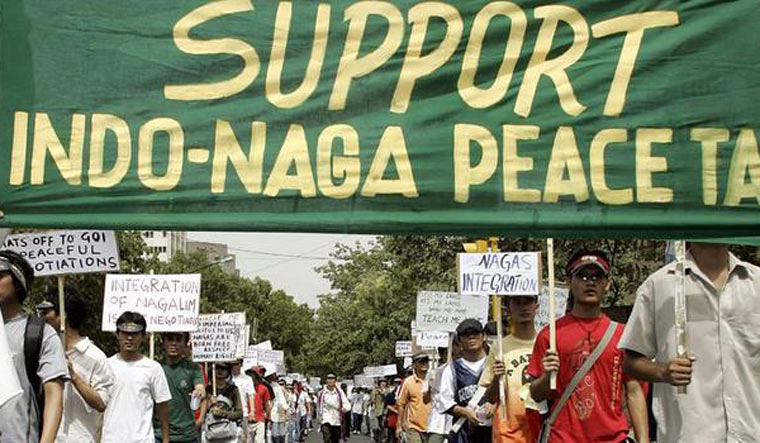The Union government is holding quiet parleys with the NSCN(IM) leadership in Delhi on Tuesday to review the progress of the Naga peace talks which are being held within the ''framework agreement'' announced by Prime Minister Narendra Modi on August 3, 2015. Hectic activity is going on between the government and the Naga groups to try and seal the Naga peace accord within the next one year.
With the 2019 Lok Sabha polls inching close, the Modi government is keen to demonstrate that its promise to end the decades long Naga insurgency was a real one. The peace talks have entered a critical phase now with only two Parliament sessions left—the upcoming monsoon session and the winter session—for the NDA government to bring any major amendments to the laws paving way for greater Naga autonomy in the form of ''shared autonomy'' between the central government and the state keeping in mind the demands of the Naga outfits led by the biggest insurgent group NSCN(IM).
To ensure shared sovereignty, the final accord will require a modification of Article 371 (a) of the Constitution and permit the transfer of powers from the Centre to the state on certain items. The main demand of the Nagas has been for a separate Nagalim, which not only includes Nagaland but hill districts of Manipur, parts of Assam and Arunachal Pradesh and large swathes of territory in Myanmar. For the peace accord to take a final shape, the government has been mulling creating autonomous hill district councils for the four Naga-inhabited districts of Manipur giving them financial autonomy.
Constitutional and administrative amendments will be required to transfer the right to explore oil and natural gas, coal, minerals, forest and other natural resources to the state's domain, said sources. Entries in the concurrent list of the Constitution which deal with the transfer of property other than agricultural land, matters related to vagrancy, nomadic and migratory tribes, religious institutions and protection of wild animals will also need to be transferred to the state list.
What is noteworthy is that the government's interlocutor for Naga talks, R.N. Ravi has managed to initiate talks with the other outfits like NSCN(KN) and the Naga HO HO—the apex tribal body of the Nagas. The Naga National Political Groups, which is an important stakeholder in the peace talks and has representation of all Naga groups, is also in talks with the government, which is a significant shift from the way in which the peace initiative had first begun only keeping the NSCN(IM) in loop.
Sources involved in the peace talks revealed that the various Naga outfits also want a solution to the vexed problem sooner than later by bringing the negotiations to a logical conclusion.
However, what remains a challenge for the central government is how to ensure that the geographical integrity of states like Manipur or Assam is not compromised while arriving at an acceptable solution. Whether the government is able to bring about a 'political solution that is “inclusive, honorable and acceptable to the people while upholding the unique history and political rights of the Nagas'', as demanded by the Naga groups, is expected to become clear in the next few months.


